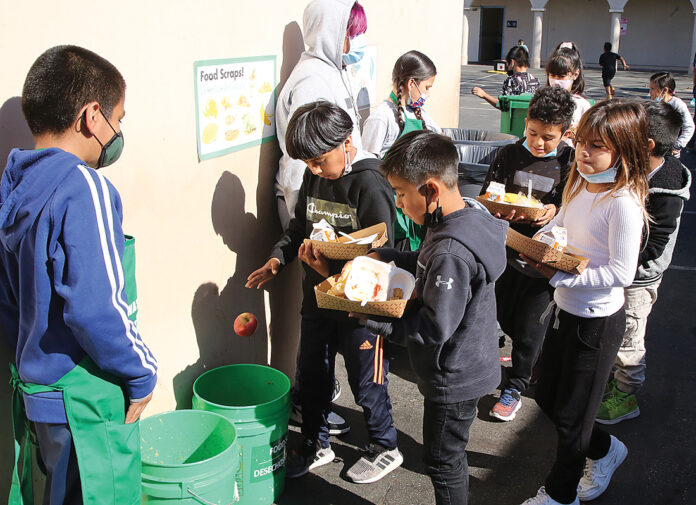WATSONVILLE—The city of Watsonville has taken its biggest step yet in making a commitment to address climate change locally.
On Oct. 26, the City Council unanimously approved the 2030 Climate Action & Adaptation Plan (CAAP), aiming to make policy changes in order to cut emissions, restore natural land and prepare for the impacts of climate change on the community.
Alex Yasbek, the city’s environmental project manager, presented the CAAP at the meeting, and was met with overwhelming support from fellow city officials and community members.
“It was exciting for a number of reasons,” Yasbek said. “That our city is so supportive, that they have backed the process the whole way … A lot of cities don’t have that, and aren’t as forward-thinking. We have the support of the planning department, public works and all the directors.”
The CAAP includes three initiatives: Climate action (reducing emissions), adaptation (preparing for climate change) and restoration (undoing the effects of climate change).
The plan aims to reduce greenhouse gas (GHG) emissions in the community to 80% lower than levels in 1990 over the next decade. It will also set a goal to become “net-negative” by 2030—that is, to remove more GHGs than emitted. This will be addressed by transportation, transitioning from natural gas to electric, investing in green energy and promoting food waste programs.
The adaptation component builds on what the city is already aiming toward with its 2020 Local Hazard Mitigation Plan, which outlined plans and programs to prepare for natural disasters. Measures include flooding and wildfire preparation, agriculture and food resilience, and energy resilience—meaning, improvements to the city’s power grid, backups at critical facilities and the introduction of a new microgrid at the Wastewater Treatment Plant.
Lastly, climate restoration addresses carbon sequestration (tree planting, regenerative agriculture), ecosystems (habitat restoration, water quality) and what the city calls “equitable green recovery;” creating green jobs and infrastructure throughout the community.
Traditionally, Yasbek said, climate work has focused mainly on carbon emissions, without much attention to the natural world. But these things can no longer be ignored, he said.
“And the thing is, when you address those issues, you also address emissions,” Yasbek said. “Everything is interconnected. We need to be changing, rethinking everything.”
The city, especially in recent years, has shown support and interest in addressing climate change, working closely with organizations such as Regeneración and Watsonville Wetlands Watch.
In 2021, it endorsed the Climate-Safe California Campaign’s goal of net-negative emissions by 2030. In September, Watsonville became the first city in California to adopt a resolution urging Gov. Gavin Newsom to declare a State of Emergency for the climate crisis.
City Council member Rebecca Garcia, who brought forward the resolution at a Sept. 14 meeting, said she was inspired after being approached by representatives from the Let’s Green California movement.
“I was asked to sign their petition,” she explained. “A few days later I was thinking, why can’t a city do that, too? As a jurisdiction.”
But the CAAP is more than an endorsement—it is a tangible, legally-binding document that will be assessed in accordance with the California Environmental Quality Act.
“This plan has an actual target … It is a firm commitment,” Yasbek said. “Meaning, if we don’t meet our goal in 10 years, we can be taken to task.”
According to the CAAP’s executive summary, an interdepartmental team of city staff, along with a Community Advisory Committee (CAC), will be responsible for moving that work forward. The team will provide annual progress reports and a GHG inventory update every two years to track progress, plus prepare updates at least every two years to incorporate changes in legislation, technology, economy, policy and human behaviors.
“It will take a lot of effort and change from everyone to reach this goal,” Yasbek said. “It will not be easy. But it’s not overly difficult either; it’s definitely achievable. We are picking ambitious goals because that’s where the science says we need to be.”
Outside support will also be an essential component to the plan’s success. A Public Engagement Plan has been developed, and within it are plans to form the CAC to advise the city on how best to engage with the public.
“This is going to take more than just the City Council,” Garcia said. “It has to include the public. And it’s looking good. At the [Oct. 26] meeting, at least 12-14 community members spoke in support of this plan. And we often get emails from people asking how they can do better.”
However, Garcia said, the city recognizes that climate change is also a social justice issue. Often, it’s the residents who are most impacted by climate change who cannot immediately take steps to stop it. Bringing equity into the picture can be anything from helping people purchase electric vehicles, to finding them local employment so that they don’t have to commute as far.
“This plan recognizes that there needs to be more support for people to start climate action,” Yasbek added. “We can’t just tell people to buy an electric car. A lot of them can’t afford that. Equity, the environmental justice component is really important.”
Garcia said she was “very excited” about the adoption of the CAAP, and hopes that other cities, counties and regions will implement similar plans in the future.
“Watsonville is the leader in this region in terms of what we’re doing to address climate change,” she said. “We are going to be a model for other jurisdictions.”
Added Yasbeck: “It almost feels like we’ve reached a turning point in public perception of climate change. I’ve been aware of these issues for over 20 years … but now I feel this groundswell of action and awareness.”
For information about the 2030 Climate Action & Adaptation plan and to read more about each initiative, visit bit.ly/2ZLKGQ7.









